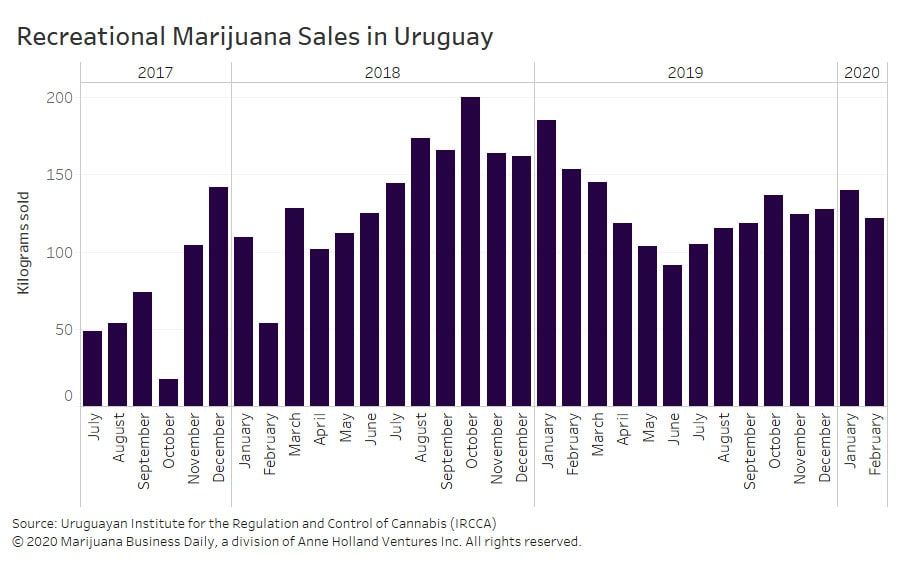Brazil’s health authorities authorized the first medical cannabis product registered under rules created in December 2019, marking an important milestone for the industry in Latin America’s largest economy.
The THC-free CBD product, registered to Brazilian pharmaceutical giant Prati-Donaduzzi, obtained “sanitary authorization” this week, according to a notice in the country’s official Gazette.
The company declined interview requests from Marijuana Business Daily.
The 2019 rules paved the way for bulk import, manufacture (if needed) and distribution to pharmacies of medical cannabis products that have not completed clinical trials.
The rules do not allow for domestic cultivation, nor do they allow for the import of “the (cannabis) plant or its parts.”
The “sanitary authorization” designation permits the product’s manufacture in Brazil.
Doctors will be able to prescribe the Prati-Donaduzzi product, and patients can expect to find it in local pharmacies.
The Paraná-based company promises to have the product available in pharmacies before Mother’s Day – which falls on the second Sunday of May – “to value and recognize all mothers who fight for their children’s right to access treatment,” Eder Fernando Maffissoni, director-president of the company, said in a news release.
The Prati-Donaduzzi product is an oral solution containing 200 milligrams of CBD per milliliter.
The company also claims “a version of the product” is “in the final stages” of a Phase III clinical trial. The company has been conducting scientific research in the area for more than six years, the communication said.
Brazil’s National Sanitary Surveillance Agency (ANVISA) needed only 35 days to analyze and approve Prati-Donaduzzi’s application for a sanitary authorization.
Imports
By rejecting domestic cultivation in 2019 but allowing manufacture, Brazilian health authorities effectively established a promising import market for raw extracts, isolated cannabinoids or finished products.
Importing “the plant or its parts” remains prohibited by the regulations.
That means Prati-Donaduzzi must import the CBD needed to manufacture the final product in Brazil.
Vancouver, British Columbia-based Brains Bioceutical has been shipping CBD as an active pharmaceutical ingredient (API) for research purposes to Prati-Donaduzzi in Brazil from its United Kingdom operations.
The companies have an ongoing supply agreement that has seen more than 100 kilograms shipped so far, Brains Bioceutical CEO Rick Brar told MJBizDaily.
“Brains will continue providing its EU-GMP (European Union-Good Manufacturing Practice)-certified, plant-derived CBD API to be used in the Prati-Donaduzzi products,” the CEO said.
“Now that Prati-Donaduzzi can start commercializing the registered product, we only expect to ramp up our supply agreement.”
Prati-Donaduzzi has been working on the development of synthetic CBD, but the “sanitary authorizations” category does not allow the use of synthetic active ingredients.
Synthetic CBD products must follow the same standard registration path of any other medicine with completed and successful clinical trials.
New regulations
The 2019 regulations effectively created a temporary scheme.
The regulations have a “transitional” validity and will be reviewed in three years.
The objective is to temporarily allow sales of cannabis products that meet the stringent quality requirements but do not have clinical trials to support efficacy.
Prati-Donaduzzi’s authorization is valid for two years.
Sanitary authorizations can be granted only for a period of up to five years. After that time, products must obtain a registry, like any other medicine with proven efficacy, in order to continue sales.
According to the regulations, Brazil’s physicians can prescribe products with a sanitary authorizations only after all “other therapeutic options in the Brazilian market” have been tried.
Products with more than 0.2% THC that have sanitary authorization – of which there are none registered – can be prescribed only for palliative care for terminal patients “without any other therapeutic alternative,” according to the regulations.
Extreme marketing restrictions apply for all sanitary authorizations. Quality requirements are stringent and include GMP certification.
In principle, only a GMP certification from ANVISA is allowed, but until December 2022, GMP certifications issued by health agencies of PIC/S countries may also be accepted by ANVISA.
Although Prati-Donaduzzi’s CBD product is the first to be registered under the rules created by ANVISA in December 2019, it is not the first cannabis product registered in Brazil.
GW Pharmaceutical’s Sativex was registered years ago as a standard medicine with proven safety and efficacy.
When it comes to “nonregistered” cannabis products, dozens of companies ship to Brazil on a case-by-case basis under a so-called “compassionate use” scheme. These products cannot be imported in bulk nor be sold by pharmacies.
This means, in practice, Brazil has three different categories of cannabis products:
- Cannabis-based medicines registered like any other medicine, for which efficacy and safety must be proved. So far, that includes only GW Pharmaceuticals’ Sativex, sold under the name of Mevatyl in Brazil.
- Registered cannabis products with “sanitary authorization,” the new category created by ANVISA in December 2019. These products do not require proven efficacy via clinical trials during the first five years but must be registered. Domestic manufacturing and sales to patients with a prescription in pharmacies is allowed. So far, the only product is the one registered by Prati-Donaduzzi.
- Authorizations granted on a case-by-case basis to individual patients to import nonregistered cannabis products, which also do not require clinical trials. This has been in place since 2014 and is sometimes called “compassionate use.”
More information about the Brazilian rules for “sanitary authorizations” can be found in MJBizDaily‘s previous analysis of the regulations here and here.
Alfredo Pascual can be reached at alfredop@mjbizdaily.com





